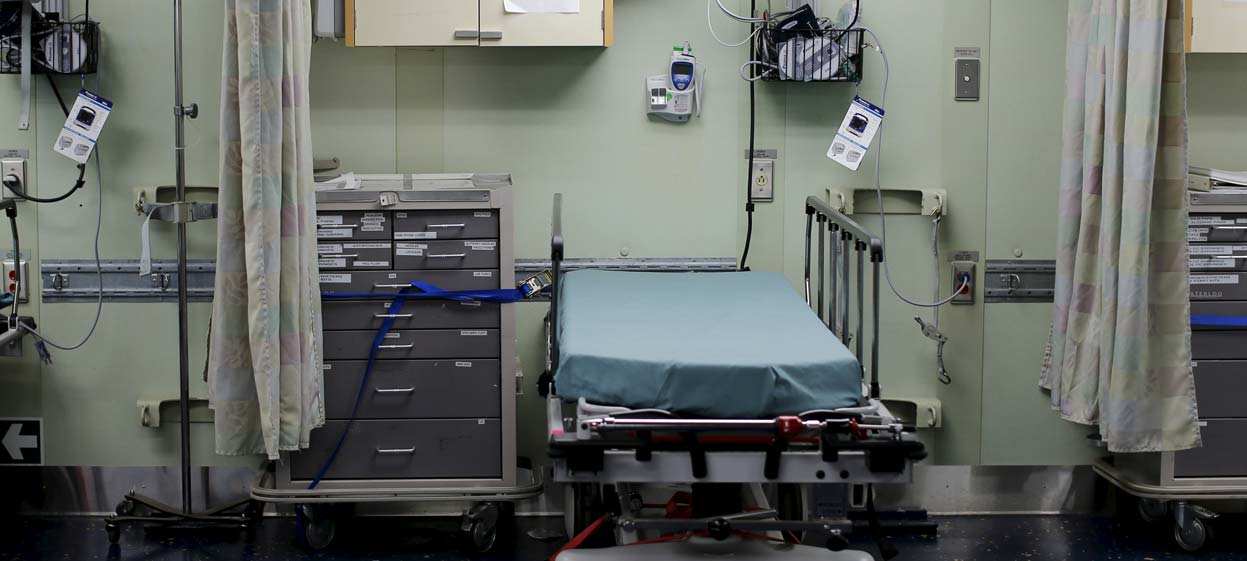Story Highlights
- Sixty-eight percent support euthanasia
- Most of the increased support came from 18- to 34-year-olds
- Use of word "suicide" does not appear to temper support
WASHINGTON, D.C. -- Nearly seven in 10 Americans (68%) say doctors should be legally allowed to assist terminally ill patients in committing suicide, up 10 percentage points from last year. More broadly, support for euthanasia has risen nearly 20 points in the last two years and stands at the highest level in more than a decade.
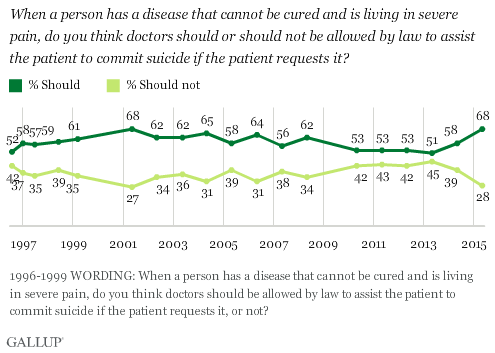
These results come from Gallup's Values and Beliefs survey, conducted May 6-10. Typically, firm majorities of Americans have supported physician-assisted suicide for certain types of medical patients, though the magnitude of the support ebbs and flows. In 2001, support for physician-assisted suicide mirrored the current peak -- 68% -- and remained slightly below that level for the ensuing decade. Possibly in response to the accusations of "death panels" that arose during the acrimonious debate surrounding passage of the Affordable Care Act, support dropped to bare-majority levels throughout much of President Barack Obama's first term. Public support for euthanasia fell to a low of 51% in 2013, before rebounding to 58% last year.
This year finds an uptick in support for euthanasia after the high-profile story last year of 29-year-old Brittany Maynard. Dying from terminal brain cancer, Maynard left her home state of California, where physicians are barred from assisting suicide, and ended her life in Oregon, where the practice is legal. Somewhat in response to this well-publicized story, the California state Legislature is currently considering a bill that would legalize doctor-assisted suicide.
The larger effect that Maynard's story will have is uncertain, but some notable changes in support are evident compared with last year. The percentage of young adults aged 18 to 34 who support doctor-assisted suicide climbed 19 points this year, to 81%. Young adults are now significantly more likely than older U.S. adults to support doctor-assisted suicide.
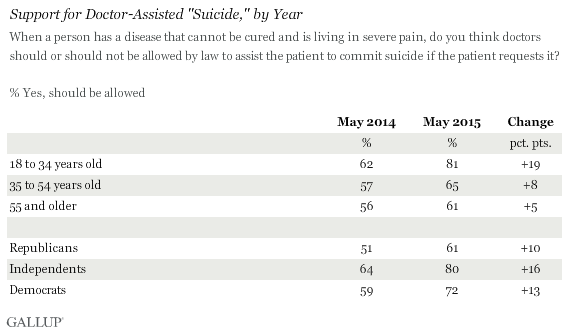
Meanwhile, support for physician-assisted suicide increased among all three major political affiliations, suggesting no partisan tilt to these changing views.
Use of Word "Suicide" Does Not Diminish Support for Euthanasia
Gallup has also trended a different version of this question that does not mention the word "suicide" but instead asks about doctors being allowed by law to "end the patient's life by some painless means." Americans have historically responded more favorably to the latter wording than the former. This year, both question wordings register nearly identical support, though it is unclear what the longer-term significance of this change may be.
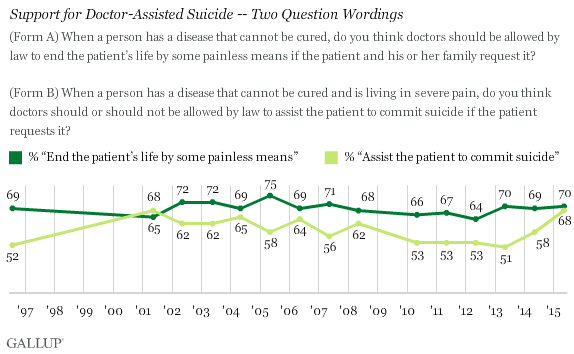
As Gallup has noted before, the fact that one question provides the respondent with a softer description of euthanasia -- referring to it as "ending a patient's life by some painless means" -- is a likely reason it typically has earned a larger share of support among U.S. adults. The other question, by specifically describing euthanasia as "suicide," introduces an emotionally charged word into an already sensitive subject.
A majority of Americans also say "doctor-assisted suicide" is "morally acceptable," an increase of seven points since 2001. The morality of doctor-assisted suicide has historically been among the most divisive of several moral issues Gallup has tracked since 2001. Once again, question wording is important. This question does not speak to whether doctor-assisted suicide should be permitted, but whether the respondent considers the action morally acceptable. Also of importance is that this item, unlike the two questions examined before, does not provide a larger context as to why or under what conditions doctor-assisted suicide would occur.
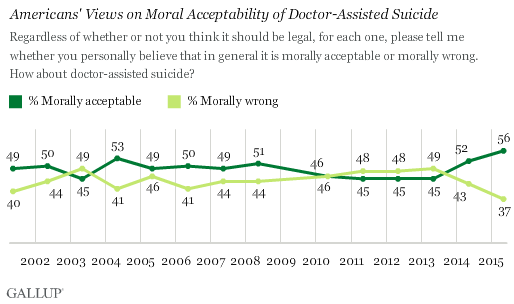
Still, even without the sympathetic background information of the other items, there has been a marked increase in the number of U.S. adults describing doctor-assisted suicide as "morally acceptable." In 2013, less than half of the country said it was morally acceptable (45%), one of the lowest measurements in the question's history. In a swing of 11 points from 2013, now a clear majority say it is morally acceptable.
Bottom Line
Consistent with changing attitudes related to a number of once-controversial social issues, the number of U.S. adults supporting physician-assisted suicide now ties the highest level seen in more than a decade and represents a rebound in support after it receded early this decade. Even the use of the word "suicide" in the description of medical euthanasia appears not to have tempered national support, a break from past years when its inclusion seemed to make some difference in national perceptions.
Survey Methods
Results for this Gallup poll are based on telephone interviews conducted May 6-10, 2015, with a random sample of 1,024 adults, aged 18 and older, living in all 50 U.S. states and the District of Columbia. For results based on the total sample of national adults, the margin of sampling error is ±4 percentage points at the 95% confidence level.
For results based on the sample of 497 national adults in Form A, the margin of sampling error is ±5 percentage points.
For results based on the sample of 527 national adults in Form B, the margins of sampling error is ±5 percentage points.
All reported margins of sampling error include computed design effects for weighting.
Each sample of national adults includes a minimum quota of 50% cellphone respondents and 50% landline respondents, with additional minimum quotas by time zone within region. Landline and cellular telephone numbers are selected using random-digit-dial methods.
View complete question responses and trends.
Learn more about how Gallup Poll Social Series works.
